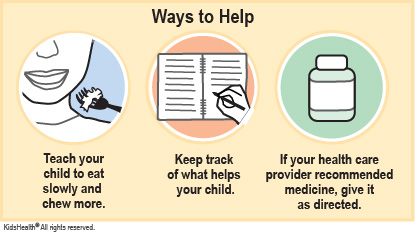Gas Pain: How to Care for Your Child
Gas can cause a feeling of bloating (fullness or swelling) or belly pain. Your child's health care provider didn't find any serious problems and thinks that gas is causing your child's discomfort. Making some changes in their diet and eating habits can help kids with gas pain feel better.


-
Give your child any recommended medicines as directed by the health care provider.
-
Kids often eat too fast. Encourage your child to eat slowly and chew food carefully.
-
Try to find out what foods seem to be causing gas in your child. It can help to keep a diary of foods eaten and any symptoms that follow. Then:
-
If sodas and other non-nutritious items are causing gas, don't serve them.
-
If healthy options (fruits, dairy, vegetables, etc.) are a problem, only serve them in small portions or look for alternatives that don't cause as much gas.
-
Discourage gum-chewing.

Your child has:
-
pain or discomfort in the belly or chest after eating or drinking
-
vomiting or diarrhea
-
less of an appetite than usual
-
constipation
-
fever
-
a change in the color of the poop
-
weight loss

Your child:
-
has severe or long-lasting belly pain, or pain that wakes him or her up at night
-
has a hard or swollen belly
-
vomits liquid that looks like coffee grounds or blood
-
appears dehydrated; signs include dizziness, drowsiness, a dry or sticky mouth, sunken eyes, crying with little or no tears, or peeing less often (or having fewer wet diapers)

What causes gas pain? Gas is air that comes out of the body, either by passing through the mouth (burping) or through the bottom (farting). Everyone has some gas — that is normal. But if kids have a lot of gas or it doesn't pass out of the body as usual, it can cause belly pain and bloating.
Too much gas can happen from:
-
swallowing too much air, often while eating, drinking, or chewing gum
-
eating or drinking certain foods or fizzy drinks
-
a problem with digesting some foods, such as wheat or dairy products
-
a health condition that makes it harder for gas to pass from the body
Which foods can cause gas pains? Foods known to cause gas pains include broccoli, cauliflower, cabbage, Brussels sprouts, asparagus, beans, apples, pears, peaches, prunes, whole grains, juices, milk, yogurt, cheese, sugar-free candy, and sodas and other fizzy drinks.